Tools Required
J 42055 Transmission Support Fixture
Removal Procedure
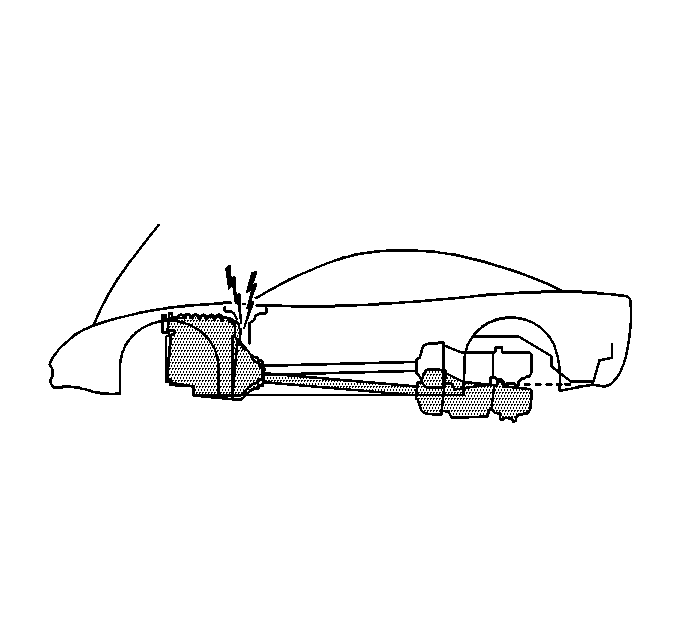
Notice: Failure to follow the proper removal and installation procedures may result in damage to the engine crankshaft thrust bearing.
Notice: When tilting down the rear of the driveline, observe the clearance between the rear of the engine and the composite dash panel. Do not allow the engine to rest unsupported against the composite dash panel, or vehicle damage may result.
Notice: When lowering and removing the rear of the driveline, observe the clearance between the rear of the transaxle assembly and the underbody to prevent damage.
- Disconnect the negative battery cable. Refer to Battery Negative Cable Disconnection and Connection in Engine Electrical.
- Raise and suitably support the vehicle. Refer to Lifting and Jacking the Vehicle in General Information.
- Remove the rear tire and wheel assemblies. Refer to Tire and Wheel Removal and Installation in Tires and Wheels.
- Remove the catalytic converter pipe assembly. Refer to Catalytic Converter Replacement in Engine Exhaust.
- Tie off the LH muffler assembly to the underbody to support the muffler out of the way.
- Remove the RH muffler assembly. Refer to Exhaust Muffler Replacement - Right Side in Engine Exhaust.
- Remove the driveline tunnel closeout panel. Refer to Floor Panel Tunnel Panel Reinforcement Replacement in Propeller Shaft.
- Using a flat bladed screwdriver, remove the rear bellhousing access plug.
- Matchmark the transmission flexplate to the transmission torque converter through the access hole in the rear bellhousing.
- Remove the transmission flexplate to transmission torque converter bolts. Refer to Flexplate to Torque Converter Bolts .
- Remove the two plug bolts from the front of driveline support assembly.
- Install two bolts, M10 - 1.5 X 55 mm, or longer, in place of the plug bolts.
- Using a flat bladed screwdriver, remove the engine flywheel housing access plug.
- Loosen the propeller shaft hub clamp bolt (1).
- Remove the nuts retaining the transmission shift cable bracket to the transmission.
- Disconnect the transmission shift control cable from the transmission shift lever.
- Position the transmission shift cable and bracket aside.
- Remove the rear transverse spring. Refer to Rear Transverse Spring Replacement in Rear Suspension.
- Support the lower control arm with a straight jack.
- Disconnect the outer tie rod end from the suspension knuckle. Refer to Tie Rod Replacement in Rear Suspension.
- Remove the shock absorber lower mounting bolt.
- Disconnect the lower ball joint from the suspension knuckle. Refer to Knuckle Replacement in Rear Suspension.
- Remove the straight jack from the control arm.
- Repeat steps 21 through 25 for the other side of the vehicle.
- Assemble the J 42055 .
- Install the J 42055 to a transmission jack.
- Position and firmly secure the J 42055 with the transmission jack to the transmission.
- Disconnect the wiring harness and brake pipe clip retainers from the rear suspension crossmember.
- Remove the differential to transmission lower nut.
- Remove the transaxle mount to rear crossmember nuts.
- Position a transmission jack under the rear suspension crossmember and firmly secure the crossmember to the jack.
- Using ONLY HAND TOOLS, remove the rear suspension crossmember retaining nuts.
- With the aid of an assistant, slowly lower the rear suspension crossmember away from the vehicle frame rails and remove the crossmember.
- Remove the transaxle mount bracket to differential bolts.
- Remove the transaxle mount with bracket.
- Using a pry bar, CAREFULLY release the axle shafts from the differential.
- Tie off the axle shafts to the underbody to support the shafts out of the way.
- Release the retainer (1) securing (and positioning) the wiring harness to the L-shaped brackets along the driveline support assembly, then slide the harness up out of the brackets and position out of the way.
- SLOWLY lower the driveline approximately 5 cm (2 in), while simultaneously adjusting the angle of tilt, in order to access the electrical connectors.
- Disconnect the vehicle speed sensor (VSS) electrical connector.
- Disconnect the wiring harness retainer from the stud at the differential rear cover.
- Disconnect the wiring harness retainer clip from the top of the differential.
- Disconnect the transmission harness 20-way connector.
- Disconnect the park/neutral position switch electrical connectors.
- Remove the bolt retaining the transmission wiring harness to the LH side of the transmission case.
- SLOWLY lower the driveline, while simultaneously adjusting the angle of tilt, and observe the relationship between the top rear of the differential and the lowest part of the rear compartment panel floor (the center storage compartment between the frame rails). The differential should not be lowered more than approximately EVEN with the specified body point of reference.
- Release the wiring harness from the harness retainer along the top of the transmission.
- Check to be sure that the wiring harness is free from the driveline being removed.
- Disconnect the transmission oil cooler rear pipes from the junction fittings at the engine flywheel housing, then cap the pipes and plug the junction fittings to prevent contamination.
- Using a block of wood to protect the engine oil pan, place a straight jack under the rear of the engine oil pan to support the engine from stressing the composite dash panel.
- Remove the five driveline support assembly to engine flywheel housing bolts.
- Carefully bend the wiring harness bracket away from the driveline, toward the driveline tunnel wall in order to make a clear removal path for the driveline.
- Have an assistant insert a flat bladed screwdriver, or similar tool, between the edge of the driveline support assembly and the engine flywheel housing, then begin to pry the driveline loose from the engine.
- Have an assistant guide the front of the driveline during the removal of the driveline from the vehicle.
- SLOWLY lower the driveline, while simultaneously adjusting the angle of tilt and pulling the driveline away from the engine UNTIL the propeller input shaft at the front of the driveline support assembly just clears the engine flywheel housing.
- SLOWLY lower the driveline completely out of the vehicle.
- Position the chainfall, or equivalent, of a lift device in a way which will protect the transmission oil cooler rear pipes and the rear exhaust hangers located on the driveline support assembly.
- Using the lift device, raise the driveline to relieve the weight from the transmission jack.
- Disconnect the J 42055 from the transmission jack ONLY, the J 42055 will provide stability to the driveline components while working on a bench.
- Position the driveline on a workbench with the lift device still attached.
- Support the driveline support assembly and the differential for additional balance.
- Remove the lift device from the driveline.
- Disconnect the transmission oil cooler rear pipes from the fittings on the transmission, then cap the pipes and plug the transmission fittings to prevent contamination.
- Remove the transmission to driveline support assembly bolts/studs.
- Insert a flat bladed screwdriver, or similar tool, between the edge of the driveline support assembly and the transmission, then begin to pry the driveline support assembly loose from the transmission.
- Slowly slide the driveline support assembly away from the transmission while supporting the transmission torque converter.
- Using a strap positioned from side to side, secure the transmission torque converter to the transmission.
- Remove the differential to transmission bolts and nuts.
- SLOWLY slide the differential from the transmission.
- Remove the differential plate from the differential.
- Remove the transmission from the J 42055 , if necessary.
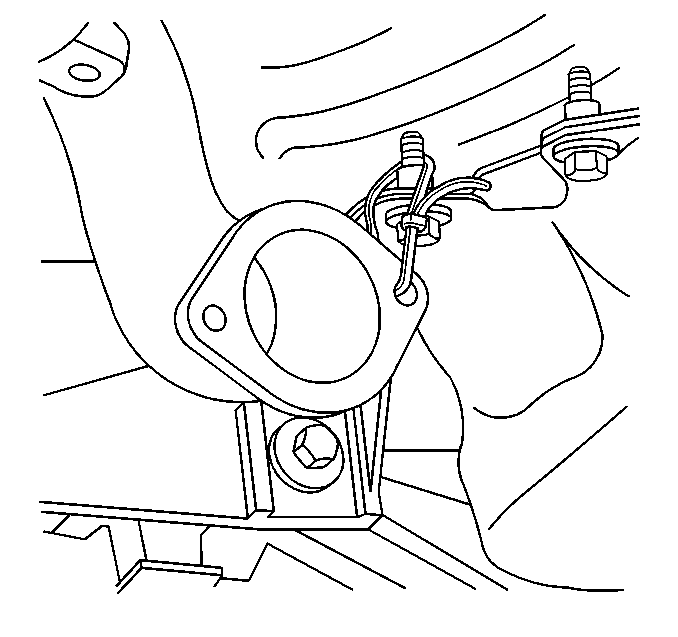
Caution: Unless directed otherwise, the ignition and start switch must be in the OFF or LOCK position, and all electrical loads must be OFF before servicing any electrical component. Disconnect the negative battery cable to prevent an electrical spark should a tool or equipment come in contact with an exposed electrical terminal. Failure to follow these precautions may result in personal injury and/or damage to the vehicle or its components.
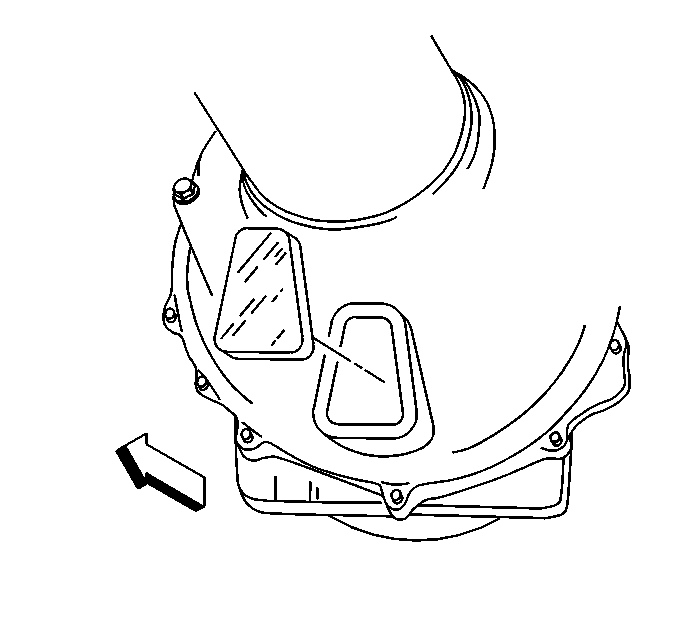
Important: The following step must be performed to assure proper torque converter balance during installation.
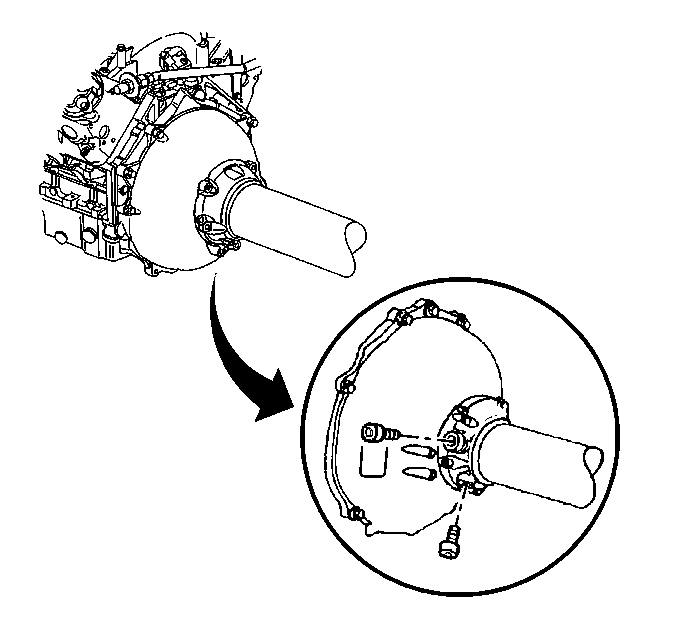
Notice: Use the correct fastener in the correct location. Replacement fasteners must be the correct part number for that application. Fasteners requiring replacement or fasteners requiring the use of thread locking compound or sealant are identified in the service procedure. Do not use paints, lubricants, or corrosion inhibitors on fasteners or fastener joint surfaces unless specified. These coatings affect fastener torque and joint clamping force and may damage the fastener. Use the correct tightening sequence and specifications when installing fasteners in order to avoid damage to parts and systems.
Important: The propeller input shaft front bearing positioning bolts are intended to remain torqued to specification and in place UNTIL INSTRUCTED in the installation procedure.
Important: Failure to use the minimum length fastener specified will prevent proper retention of the propeller input shaft front bearing during disassembly or installation.
(The long bolts are located to maintain the propeller input shaft front bearing in original position during removal and installation.)
Tighten
Tighten the propeller input shaft front bearing positioning bolts to
35 N·m (26 lb ft).
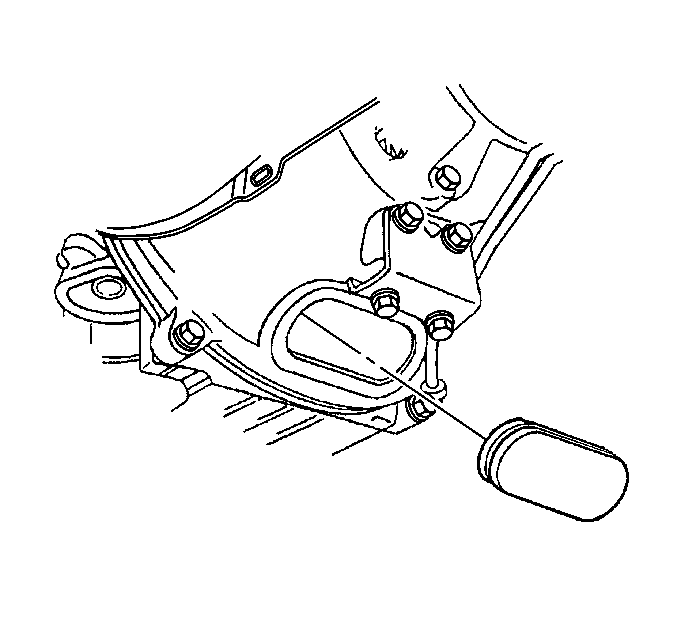
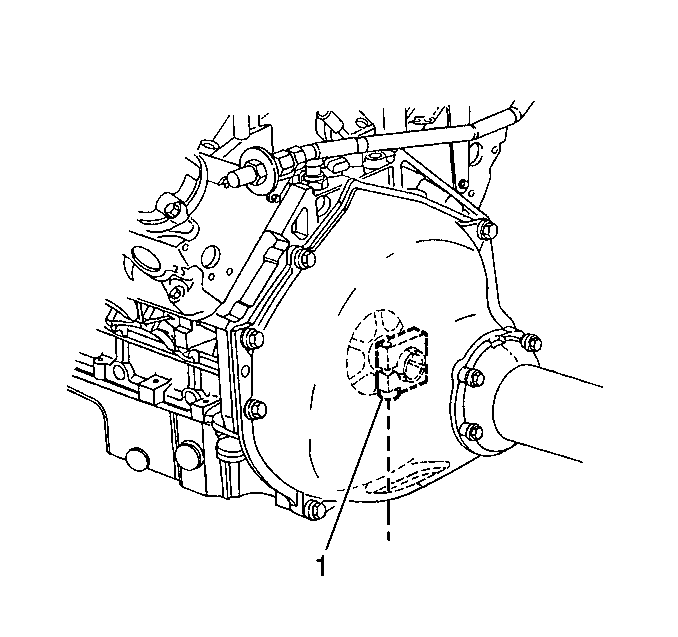
Rotate the engine at the flywheel, if necessary for alignment.
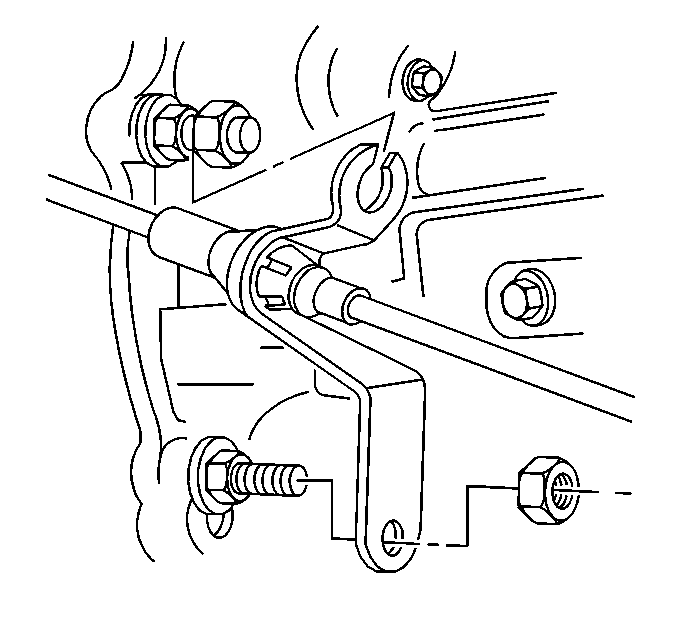
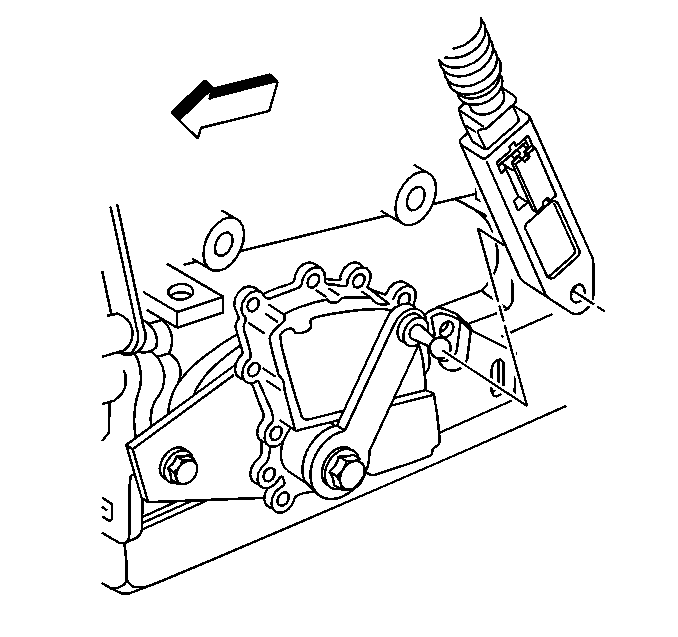
Unsnap to release the cable.
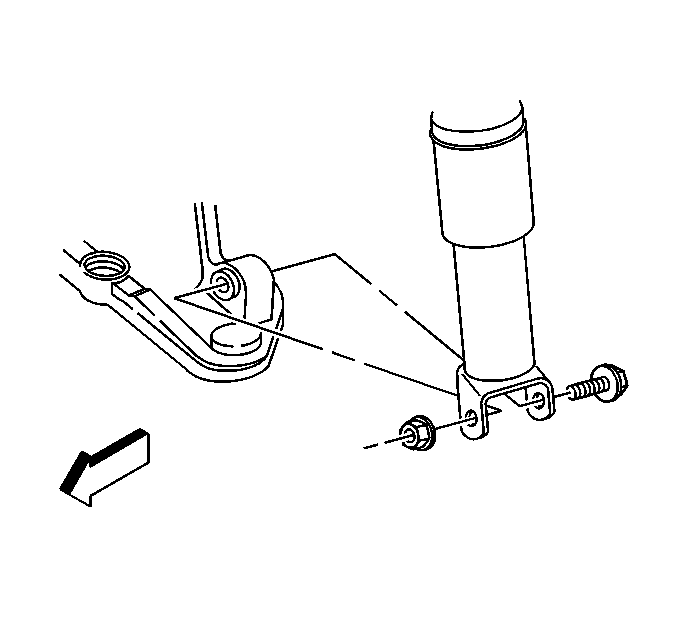
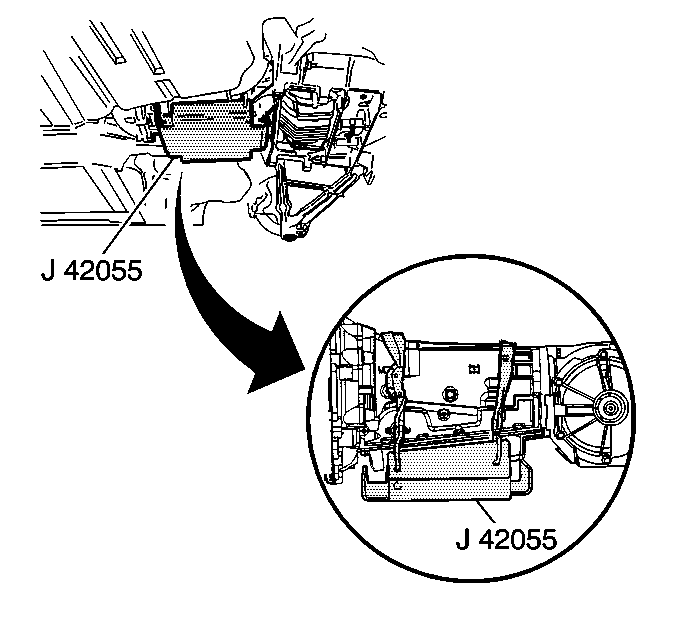
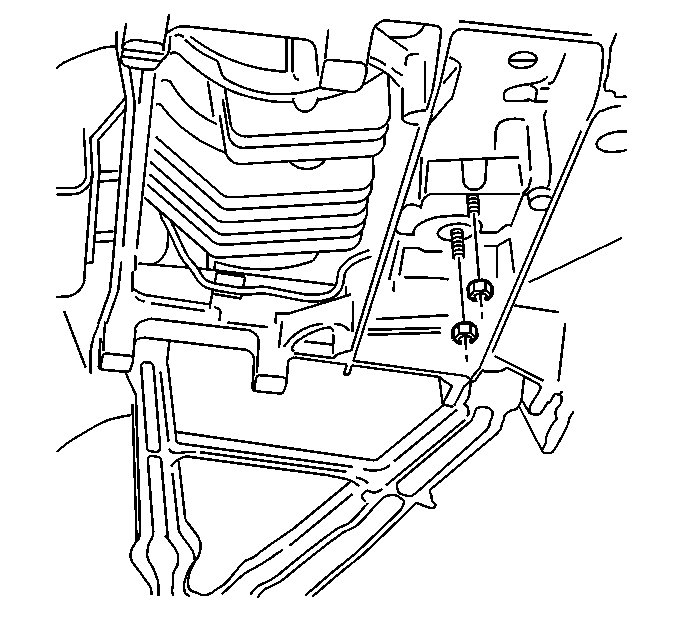
(Removing the nut at this time will aid in separating the differential from the transmission after the driveline has been removed from the vehicle.)
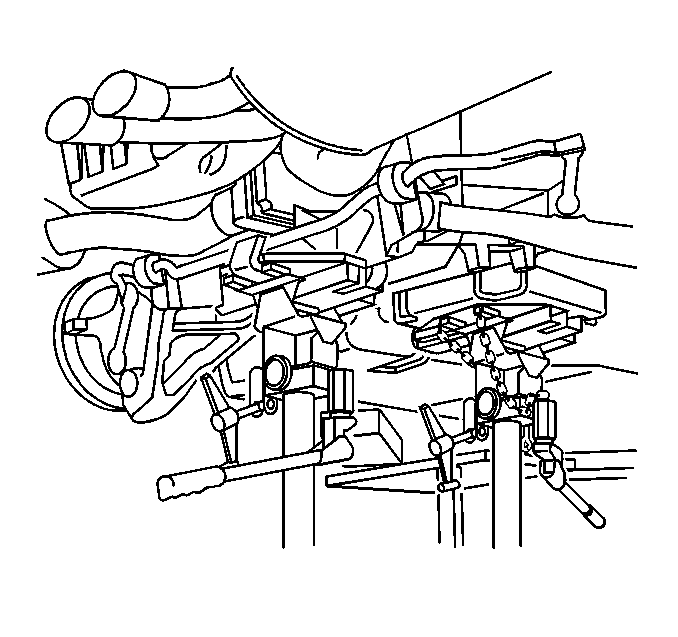
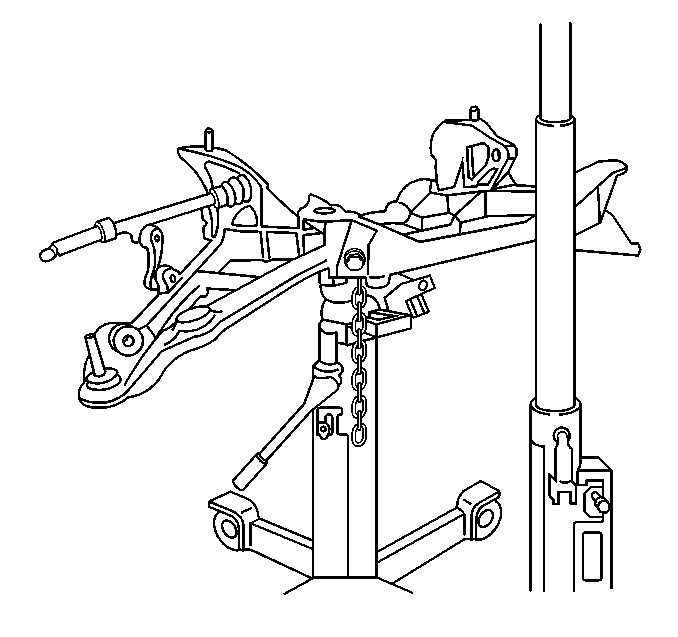
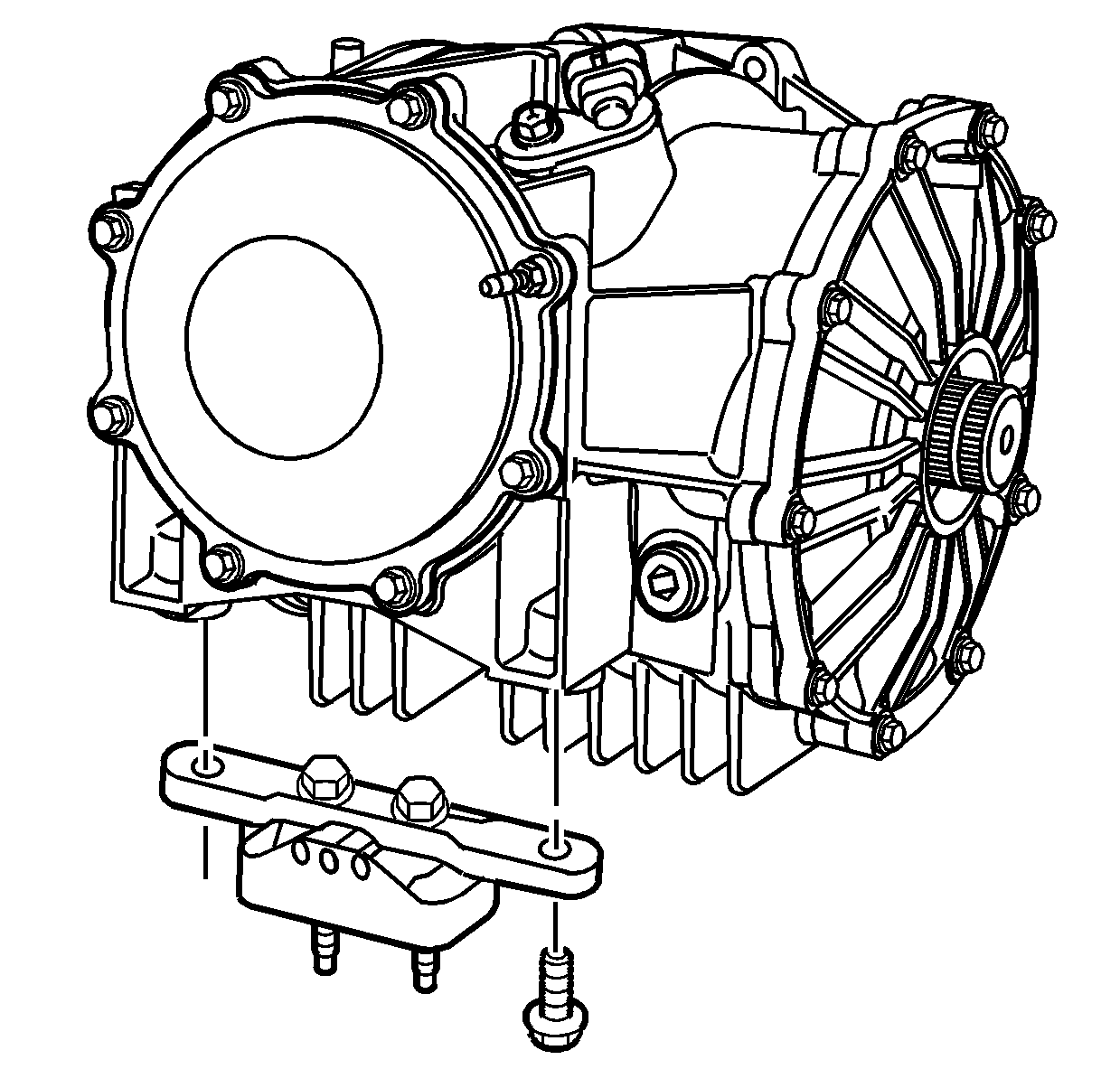
(Removing the transaxle mount will allow for greater stability on a workbench after the driveline is removed.)
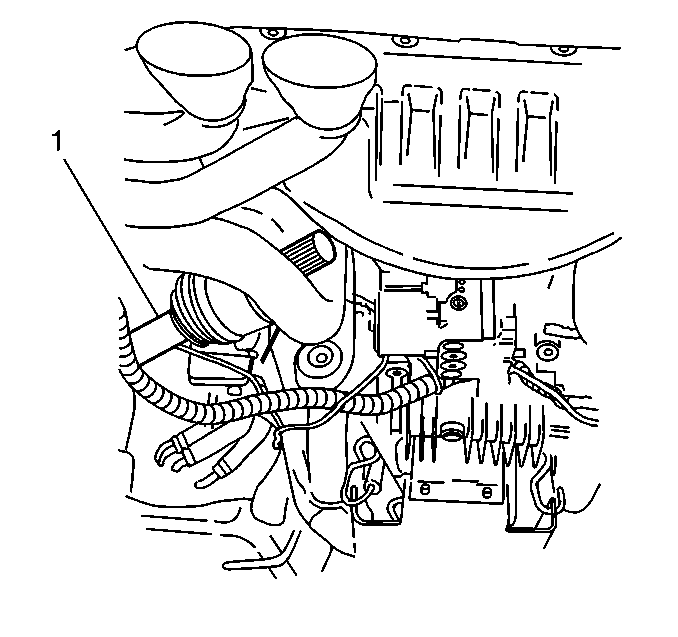
The LH muffler assembly pipe toward the rear offers a good location to help support the LH axle shaft (1).
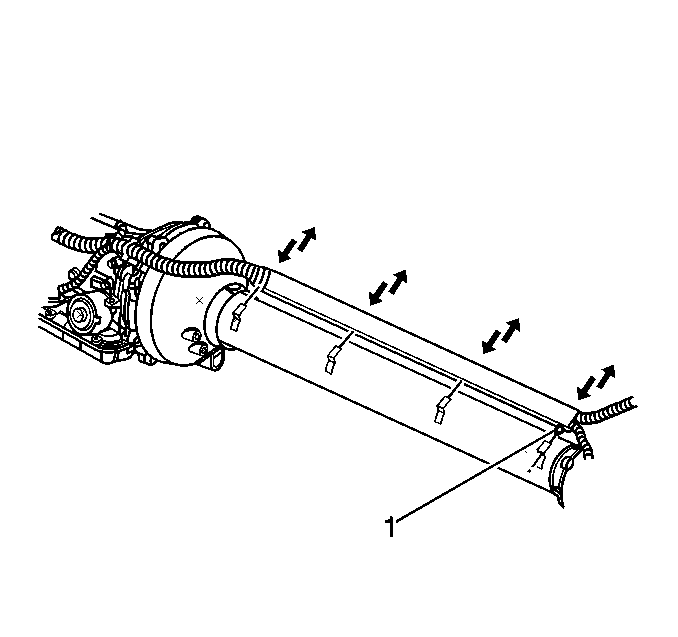
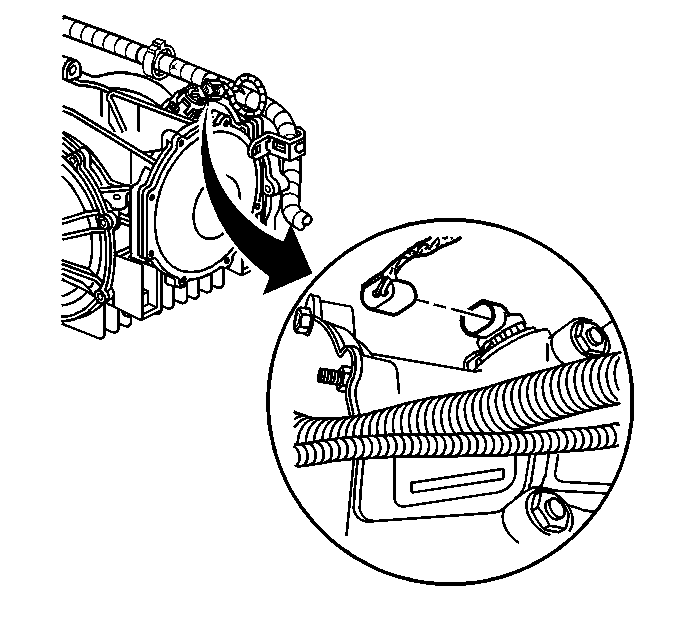
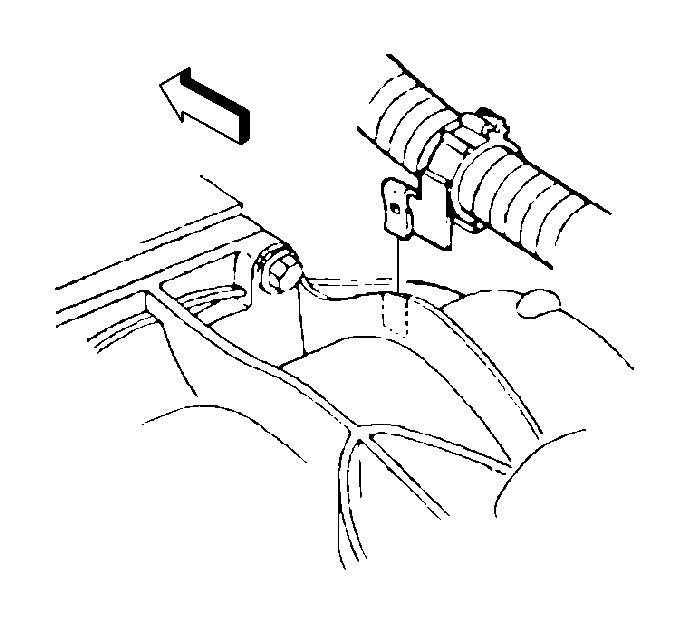
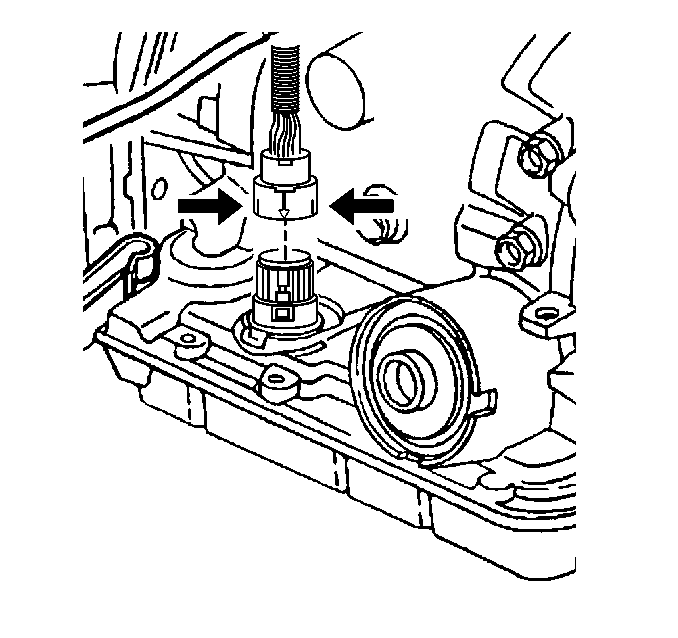
Depress both tabs on the connector and pull straight up; do not pry the connector.
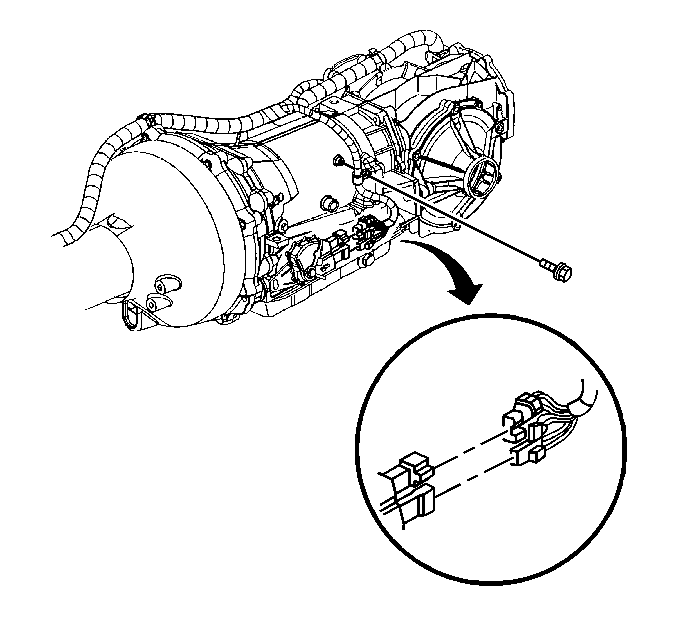
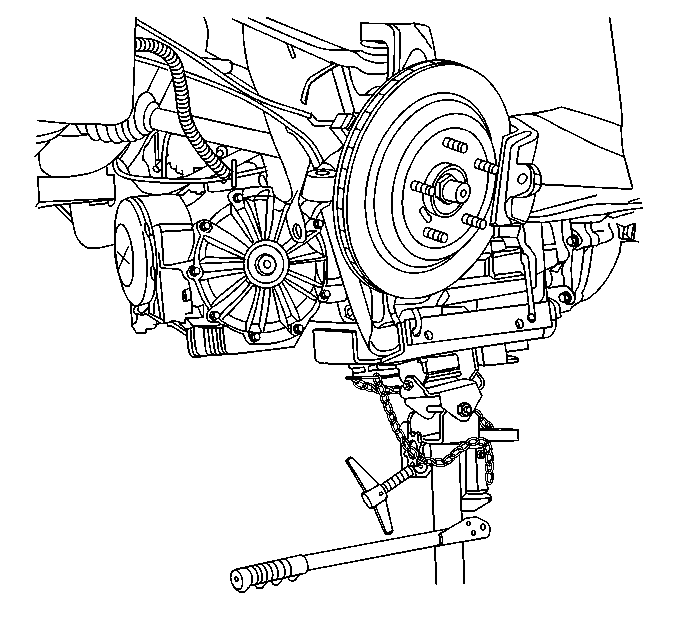
(The engine positive crankcase ventilation (PCV) pipes which route along the rear of the engine intake manifold will likely contact the dash panel.)
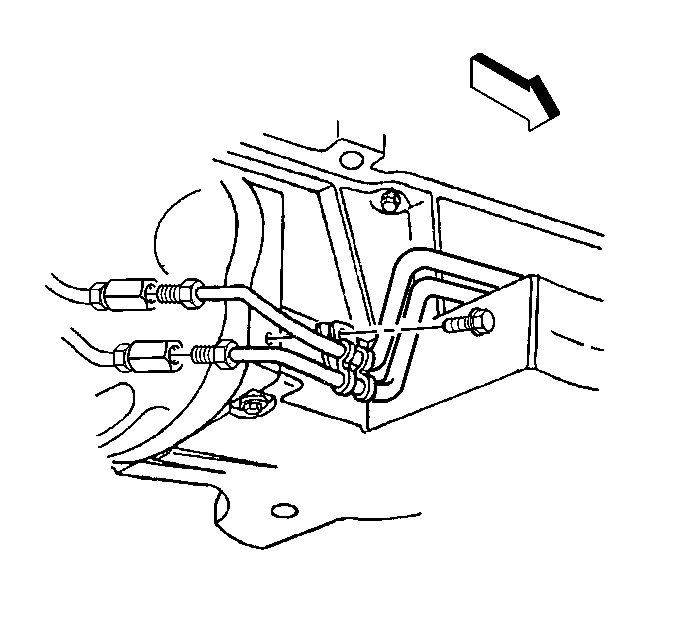
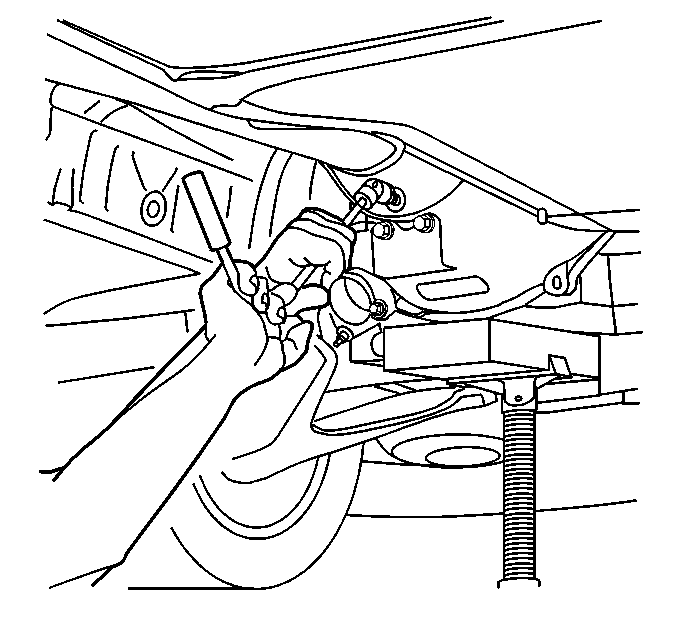
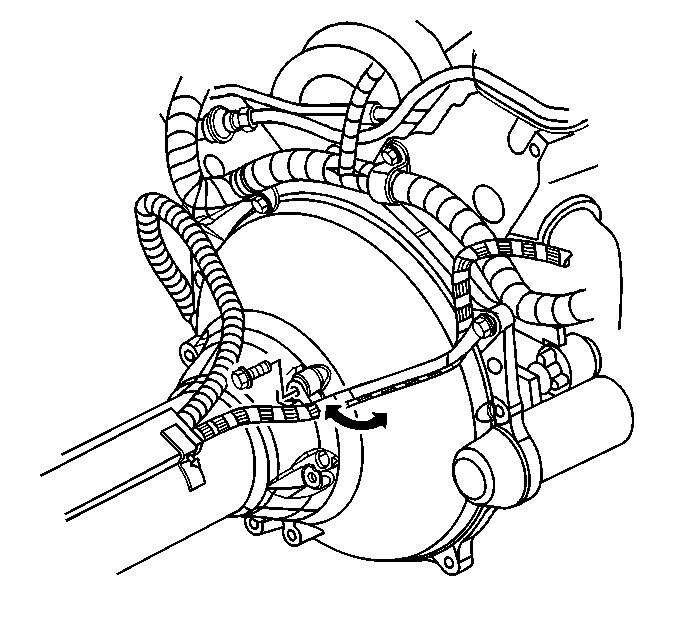
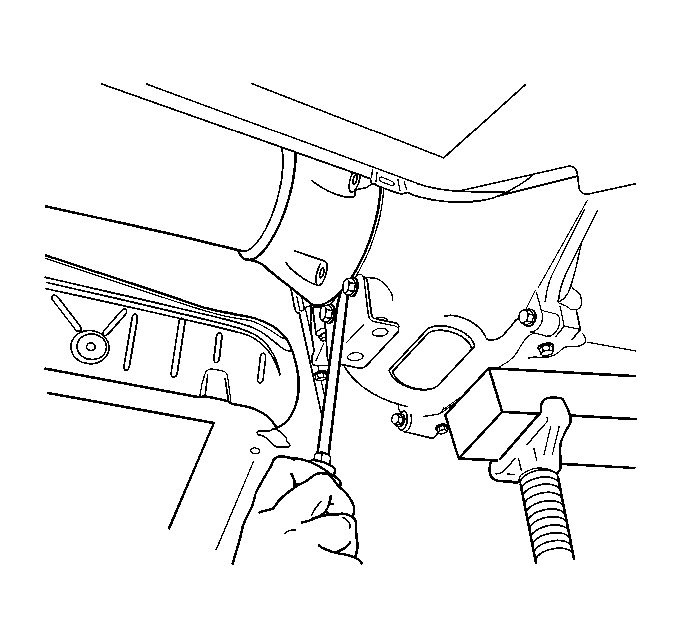
Important: The aid of an assistant will be necessary for the remaining steps.
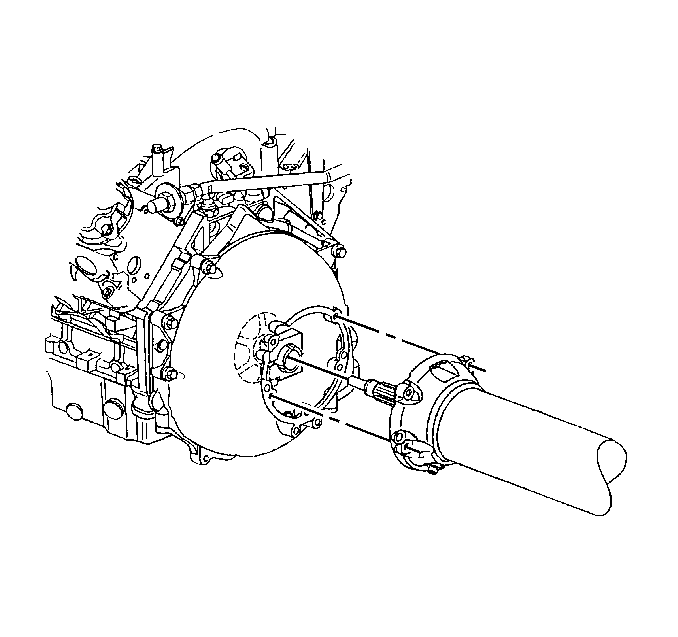
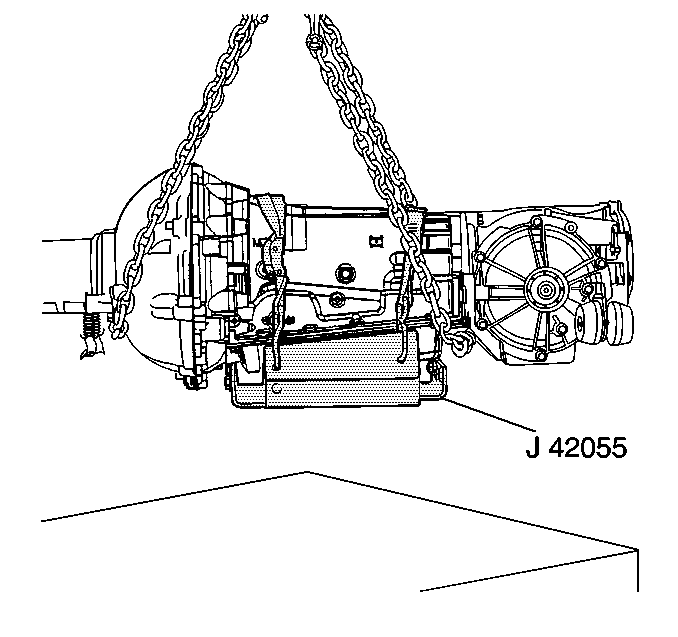
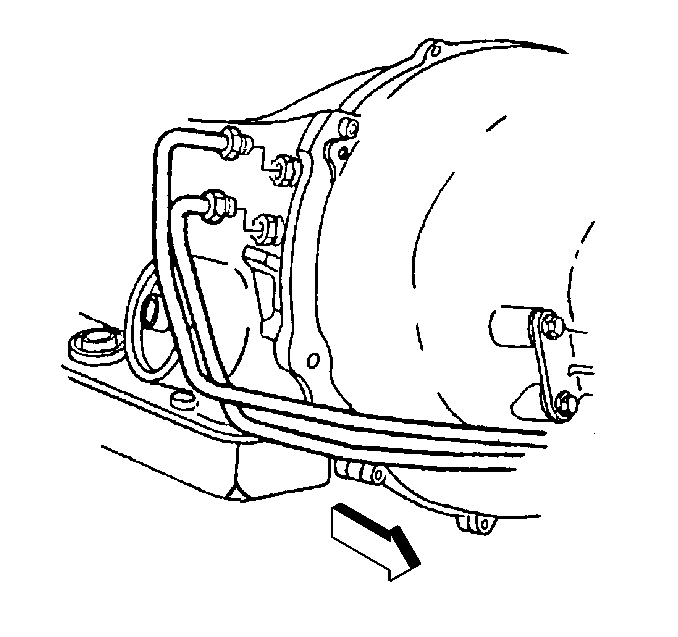
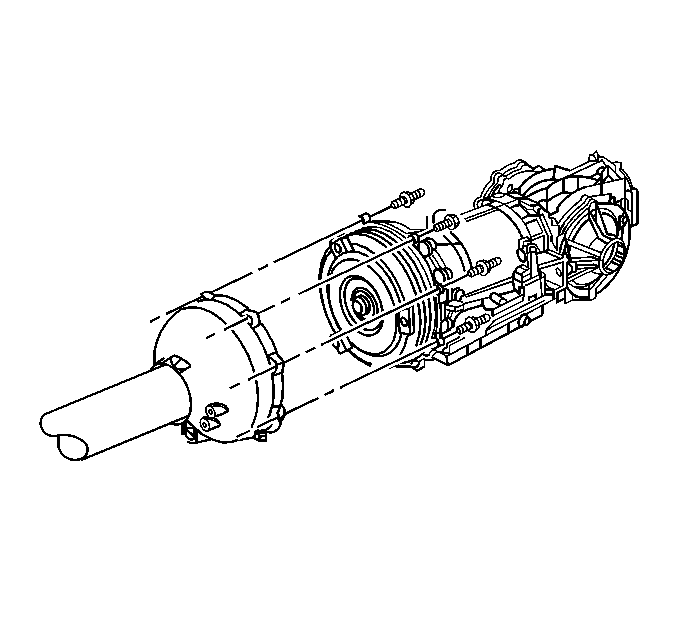
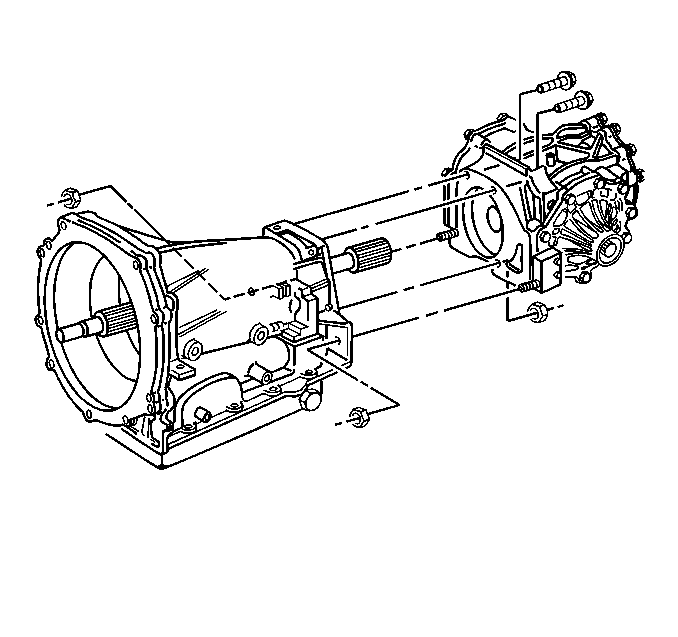
Important: Use care when separating the differential from the transmission to not damage the transmission output shaft seal in the differential plate.
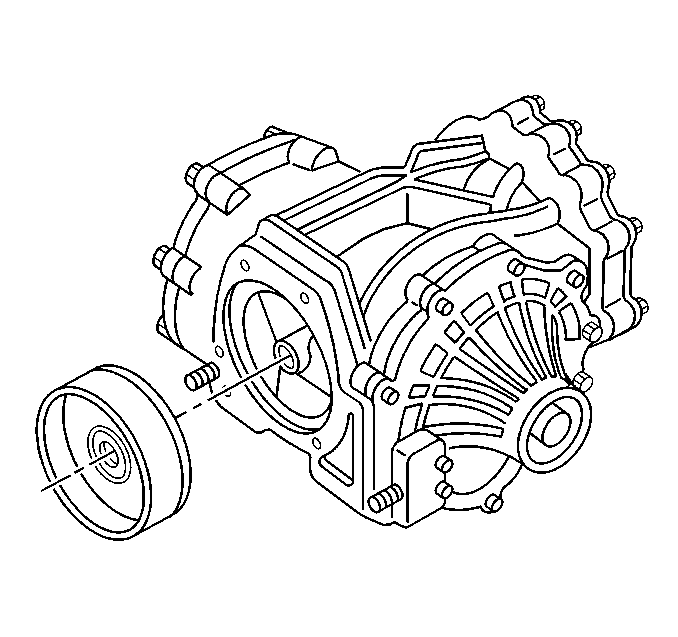
Installation Procedure
Notice: Failure to follow the proper removal and installation procedures may result in damage to the engine crankshaft thrust bearing.
Tools Required
J 42055 Transmission Support Fixture
- Install the transmission to the J 42055 , if removed.
- Install the differential plate to the transmission, use care not to damage the transmission output seal in the rear of the plate.
- Position the differential plate seal flush with the transmission case.
- SLOWLY slide the differential to the transmission.
- Install the differential to transmission bolts and nuts.
- Remove the strap retaining the transmission torque converter.
- Slowly slide the driveline support assembly to the transmission, while supporting the transmission torque converter.
- Install the transmission to driveline support assembly bolts/studs.
- Remove the caps from the rear of the transmission oil cooler rear pipes and remove the plugs from the fittings on the transmission.
- ALIGN and HAND-START, then tighten ONLY by hand to seat the transmission oil cooler rear pipes to the fittings on the transmission.
- Position the chainfall, or equivalent, of a lift device in a way which will protect the transmission oil cooler rear pipes and the rear exhaust hangers located on the driveline support assembly.
- Using the lift device, raise the driveline off the workbench and position the driveline with the J 42055 onto a transmission jack.
- Connect the J 42055 to the transmission jack.
- Remove the lift device from the driveline.
- Position the driveline under the vehicle.
- Begin to raise the driveline at the approximate angle used during removal.
- Position the wiring harness along the driveline support assembly and LOOSELY install the harness into the harness retaining slots.
- Have an assistant guide the front of the driveline so the propeller input shaft is just to the rear of the engine flywheel housing, then raise the driveline to the PROPER HEIGHT and the PROPER ANGLE to install to the engine.
- Have an assistant begin to insert the propeller input shaft into the propeller shaft hub while maintaining the proper angle of the driveline, if necessary use a screwdriver to rotate the shaft slightly to bring the splines into alignment.
- SLOWLY seat the driveline to the engine flywheel housing while maintaining the proper angle of the driveline.
- Reposition the wiring harness bracket from near the driveline tunnel wall to align with the appropriate driveline support assembly bolt hole.
- Install the five driveline support assembly to engine flywheel housing bolts.
- Install the wiring harness to the wiring harness retainer along the top of the transmission.
- SLOWLY raise the driveline to approximately 5 cm (2 in) BELOW the final installed height.
- Remove the caps from the front of the transmission oil cooler rear pipes and remove the plugs from the junction fittings at the engine flywheel housing.
- ALIGN and HAND-START, then tighten ONLY by hand to seat the transmission oil cooler rear pipes to the junction fittings at the engine flywheel housing.
- Install the transmission wiring harness to LH side of transmission case retaining bolt.
- Connect the park/neutral position switch electrical connectors.
- Connect the transmission harness 20-way connector.
- Connect the wiring harness clip to the top of the differential.
- Connect the wiring harness retainer to the stud at the differential rear cover.
- Connect the vehicle speed sensor (VSS) electrical connector.
- Slowly raise the driveline to final installation height.
- Remove the jack which supported the engine.
- Remove the tie-off retainers from the axle shafts.
- CAREFULLY align and seat the axle shafts to the differential.
- Install the transaxle mount and bracket to the differential.
- Install the transaxle mount bracket to differential bolts.
- With the aid of an assistant, begin to raise the rear suspension crossmember (still firmly attached to a transmission jack), to the vehicle frame rails.
- Guide the rear suspension crossmember alignment pins into the alignment holes in the vehicle frame rails, and guide the transaxle mount studs into the mounting holes in the crossmember, then raise the crossmember to seat to the frame rails.
- Using ONLY HAND TOOLS, install NEW rear suspension crossmember mounting nuts.
- Remove the transmission jack from the rear suspension crossmember.
- Release the J 42055 from the transmission, then remove the J 42055 and transmission jack.
- Install the transaxle mount to rear suspension crossmember nuts.
- Install the differential to transmission lower nut.
- Connect the wiring harness and brake pipe clip retainers to the rear suspension crossmember.
- Support the lower control arm with a straight jack.
- Connect the lower ball joint to the suspension knuckle. Refer to Knuckle Replacement in Rear Suspension.
- Install the shock absorber lower mounting bolt.
- Connect the outer tie rod end to the suspension knuckle. Refer to Tie Rod Replacement in Rear Suspension.
- Remove the straight jack from the suspension control arm.
- Repeat steps 45 through 49 for the other side of the vehicle.
- Install the rear transverse spring. Refer to Rear Transverse Spring Replacement in Rear Suspension.
- Carefully pull the wiring harness down into the L-shaped brackets along the driveline support assembly, align the harness retainer (locator) (1) to the hole in the forward bracket, then secure in place.
- Install the transmission shift cable and bracket into position.
- Connect the transmission shift cable to the transmission shift lever.
- Install the nuts retaining the transmission shift cable bracket to the transmission.
- Align the transmission flexplate to the transmission torque converter using the matchmark made prior to removal.
- Install the transmission flexplate to transmission torque converter bolts. Refer to Flexplate to Torque Converter Bolts .
- Install the rear bellhousing access plug.
- HAND-TIGHTEN the propeller shaft hub clamp bolt (1) until FINGER-TIGHT.
- Remove the propeller input shaft front bearing positioning bolts (M10 - 1.5 X 55 mm) from the driveline support assembly.
- Install the two plug bolts to the front of the driveline support assembly.
- Install the driveline tunnel closeout panel. Refer to Floor Panel Tunnel Panel Reinforcement Replacement in Propeller Shaft.
- Remove the tie-off retainer from the LH muffler assembly.
- Install the RH muffler assembly. Refer to Exhaust Muffler Replacement - Right Side in Engine Exhaust.
- Install the catalytic converter pipe assembly. Refer to Catalytic Converter Replacement in Engine Exhaust.
- Install the rear tire and wheel assemblies. Refer to Tire and Wheel Removal and Installation in Tires and Wheels.
- Lower the vehicle.
- Connect the negative battery cable.
- Program the transmitters. Refer to Transmitter Synchronization in Keyless Entry.
- Start and run the engine at idle until normal operating temperatures are reached.
- Turn off the engine and allow the powertrain to cool to ROOM temperature.
- Raise the vehicle.
- Tighten the propeller shaft hub clamp bolt (1).
- Install the engine flywheel housing access plug.
- Flush the transmission oil cooler. Refer to Transmission Fluid Cooler Flushing and Flow Test .
- Lower the vehicle.
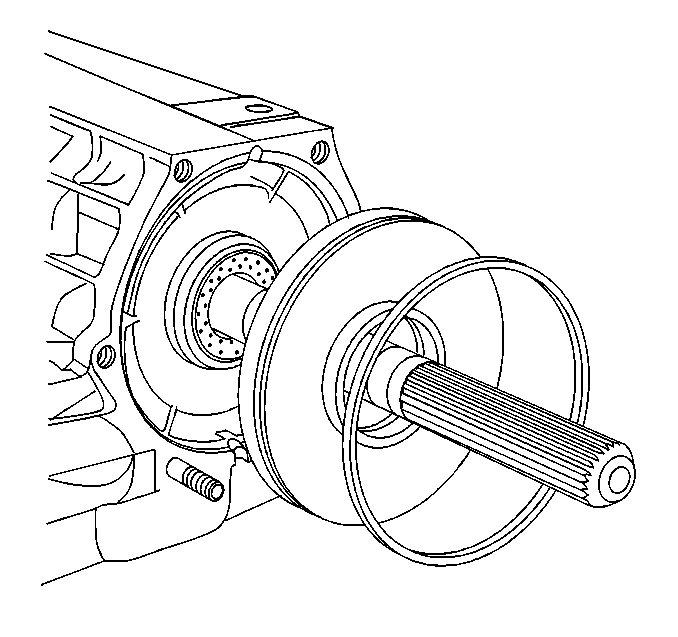

Notice: Use the correct fastener in the correct location. Replacement fasteners must be the correct part number for that application. Fasteners requiring replacement or fasteners requiring the use of thread locking compound or sealant are identified in the service procedure. Do not use paints, lubricants, or corrosion inhibitors on fasteners or fastener joint surfaces unless specified. These coatings affect fastener torque and joint clamping force and may damage the fastener. Use the correct tightening sequence and specifications when installing fasteners in order to avoid damage to parts and systems.
Tighten
Tighten the differential to transmission bolts and nuts to 50 N·m
(37 lb ft).

Tighten
Tighten the transmission to driveline support assembly bolts/studs to
50 N·m (37 lb ft).

Tighten
Tighten the transmission oil cooler rear pipes to transmission fittings
to 40 N·m (30 lb ft).

Important: The aid of an assistant will be necessary for the following steps until the driveline is installed into the vehicle.

Important: Use care not to use too much force to install the propeller input shaft into the propeller shaft hub. The propeller input shaft front bearing positioning system is designed to withstand an insertion force not greater than 582 N (130 lb).



Tighten
Tighten the driveline support assembly to engine flywheel housing bolts
to 50 N·m (37 lb ft).

Tighten
Tighten the transmission oil cooler rear pipes to junction fittings
at engine flywheel housing to 27 N·m (20 lb ft).

Tighten
Tighten the transmission wiring harness to LH side of transmission case
retaining bolt to 2.5 N·m (22 lb in).
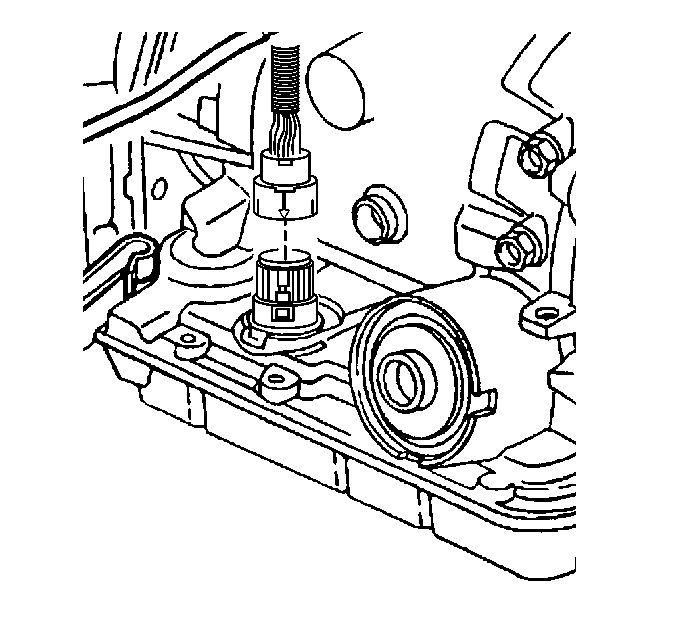
Align the arrows on each half of the connector and insert straight down.



Tighten
Tighten the transaxle mount bracket to differential bolts to 50 N·m
(37 lb ft).


Tighten
Tighten the rear suspension crossmember mounting nuts to 110 N·m
(81 lb ft).

Tighten
Tighten the transaxle mount to rear suspension crossmember nuts to 50 N·m
(37 lb ft).
Tighten
Tighten the differential to transmission lower nut to 50 N·m
(37 lb ft).

Tighten
Tighten the rear shock absorber lower mounting bolt to 220 N·m
(162 lb ft).


Press to secure the cable.

Tighten
Tighten the transmission shift cable bracket retaining nuts to 20 N·m
(15 lb ft).

Important: The following step must be performed to assure proper torque converter balance during installation.


Tighten
Tighten the driveline support assembly front plug bolts to 50 N·m
(37 lb ft).

Tighten
Tighten the negative battery cable bolt to 15 N·m (11 lb ft).
Important: The following steps MUST be performed in order to provide proper alignment of the propeller shaft hub, the propeller input shaft and the propeller input shaft front bearing.

(Idle or drive for at least 10 minutes.)
Tighten
Tighten the propeller shaft hub clamp bolt to 130 N·m (96 lb ft).

